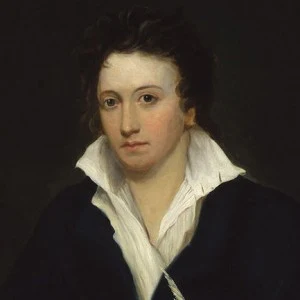Percy Bysshe Shelley
January 29, 2012
A
group of workers gathered with their families to picnic and to hear a speech.
Working class trade unions were growing in strength in 1819 and the ruling
class in England was terrified. Routed by the authorities, eleven members of
the group were killed and another one hundred and fifty were injured.
A young English poet,
Percy Bysshe Shelley, was living in Italy when the news reached him.
Enraged, he isolated
himself in a small attic room and wrote a poem in five days. When completed, he
sent it to a friend for publication. At that time, publication would have
resulted in the imprisonment of both publisher and author. The Mask of Anarchy wasn’t
published until nearly a decade after the poet’s death.
The poem resonates with
economic ideas not seriously heard in public until years later. It has been
called the finest poem of political protest ever written in our language.
Gandhi quoted it in India. During the Tiananmen Square uprising the final
verses of its ninety-two stanzas were translated and chanted by students in
Beijing, China ~
And that slaughter to the nation
Shall steam up like inspiration,
Eloquent, oracular;
A volcano heard afar.And these words shall then become
Like oppression’s thundered doom,
Ringing through each heart and brain
Heard again, again, again ~Rise like lions after slumber
In unvanquishable number
Shake your chains to earth like dew
Which in sleep had fallen on you.
Ye are many. They are few.
Thomas Jefferson
Our American Revolution
and the words of Thomas Jefferson terrified the ancien régime. The blood
of Parisian aristocrats ran in ditches dug for that purpose in the Place de la
Concorde. After Edmund Burke’s “Reflections on the Revolution in France”
appeared, many apprehensive educated persons who formerly had harbored
revolutionary thoughts launched a period of counter-revolution. Shelly was not
one of them.
If read at all in today’s
public schools, Shelly is best known for Ode to the West Wind and Ozymandias.
The latter, a sonnet, recounts a forgotten ruler’s hubris and the fate of his
empire.
Empire is a creature of
those Few who are driven to exercise power financially and militarily over
others. How can the Many, whose makeup does not oblige them to seek power over
others thwart the machinations of the Few who seek control, riches, and power
and lust after more?
We already have the
answer! In his personal papers, contained in a 1798 draft of The Kentucky Resolutions,
Thomas Jefferson wrote,
“…in questions of power then, let no more be heard of confidence in man, but bind him down from mischief by the chains of the constitution…”.
Shelley was, in many
ways, a thoroughly modern man. His revolutionary poem does have a
very contemporary ring to it, doesn’t it?


No comments:
Post a Comment
If your comment is not posted, it was deemed offensive.